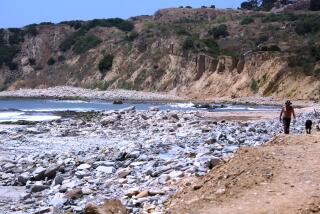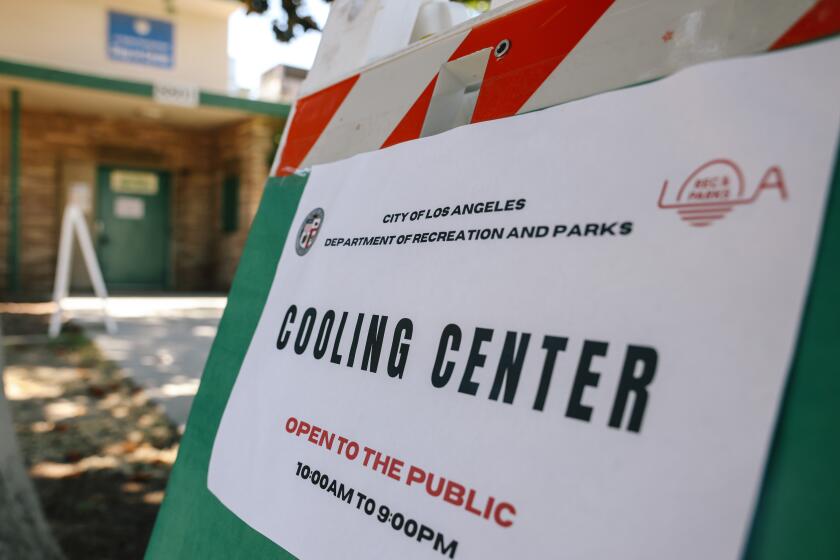Winding Spiritual Path for Suspect
Not long after being expelled from an Orange County mosque in 1997 for fighting, Adam Yahiye Gadahn returned wearing a white turban and robes styled in a fashion, one cleric remembers, similar to Osama bin Laden’s.
“When I saw that, I thought, ‘My God, this guy is going in the wrong direction,’ ” said Haitham “Danny” Bundakji, president of the Islamic Society of Orange County in Garden Grove.
On Wednesday, Atty. Gen. John Ashcroft and FBI Director Robert S. Mueller announced an international manhunt for Gadahn and six others thought to have terrorist connections. They alleged that Gadahn attended a terrorist training camp in Afghanistan and worked as a translator for Al Qaeda.
Gadahn, 25, has traveled a long road since his days as a youth on a goat ranch in the hills of southwestern Riverside County. Grandson of a prominent Jewish doctor from Orange County, he was raised by parents with eclectic religious tastes who tried to turn their backs on the modern world.
After turning to Islam as a teenager in 1995, Gadahn’s religious urges were answered at a Garden Grove mosque.
With light skin, hazel eyes and long hair, Gadahn stood out at a mosque dominated by worshippers of Middle Eastern descent. He identified himself as Yahya, the Arabic name for John the Baptist, a great prophet in Islam as well as in Christianity. His Muslim name, Yahiye, might be a variant spelling of the Arabic word.
Those who knew him recalled a quiet but angry young man who often wouldn’t say hello to passersby if he believed they disagreed with his militant interpretation of Islam.
“He would not answer much; he would not comment much,” said Muzammil Siddiqi, the Harvard-educated executive director of the Orange County Islamic center and a national Muslim leader.
Bundakji said the newly converted Gadahn mingled with half a dozen “hard-line” Muslims, a faction that Bundakji as the mosque’s president didn’t allow to meet as a group on the property. “I tried to chase these people away,” he said. “This kid [Gadahn] would give me a dirty look all the time. I could see he was going with the wrong crowds.”
Bundakji said those Muslims didn’t like the mosque’s moderate teachings and protested its outreach to Christians and Jews. He said they printed fliers calling the cleric “the Jew,” among other things.
“These people looked at us as too modern, too Americanized,” Bundakji said. “They thought we were drifting away from Islam.”
The feud erupted into violence in May 1997. Gadahn, then 18, was arrested in an attack on Bundakji.
Police said Gadahn had been fired from his position as a security guard at the mosque after he was caught sleeping on the job. They said that he persisted in hanging around the mosque after his dismissal and that when Bundakji confronted him, Gadahn punched the leader in the face and the right shoulder. Bundakji, who was 56 at the time, was not seriously injured.
Bundakji said he doesn’t recall Gadahn working for the Islamic center, just that the young man came into his office “yelling and screaming.”
Gadahn pleaded guilty to a misdemeanor count of assault and battery and was sentenced to two days in jail, time already served. He also was ordered to perform five days of community service but failed to do so, according to court records. Because of this, there is an outstanding warrant for his arrest.
Bundakji said he saw Gadahn visiting the mosque a few times after that in his new wardrobe of robes and a white turban -- worn, he said, in a style clearly meant to duplicate the garb of Bin Laden.
Gadahn’s father, Philip, 57, also remembered his son falling under the influence of a group at the mosque.
He said his son told him of visits to an Islamic center and of becoming friends with four Pakistanis. Those friends ultimately swayed the youth to visit Pakistan, his father said, and then to move there in 1998 after dabbling in a variety of odd jobs in Orange County and opting not to attend community college.
He said the family has received letters from his son -- although not recently -- written from Karachi, Pakistan.
Philip Gadahn said he hasn’t spoken with his son in 2 1/2 years. “He just called us [from Pakistan] out of the blue one day, right after 9/11.”
Philip Gadahn said he was greatly surprised to learn of the government’s allegations. On Wednesday night, he met at his home with FBI investigators.
“If [my son is] involved in what they’re saying he’s involved in, then he’s changed,” Philip Gadahn said.
Federal officials said they aren’t sure how Gadahn fits into Al Qaeda’s terrorist operation and conceded that he may be little more than an English-speaking sympathizer of Islamic radicals.
“It was not as if he was on the radar screen as a Top 10 terrorist or anything like that,” said one counterterrorism official, speaking on condition of anonymity.
Gadahn first came to the attention of the FBI’s Los Angeles office and local intelligence about the time that he was asked to leave the Orange County mosque, federal officials said.
“For at least five years or longer, we have known he was someone worthy of further investigation,” said the counterterrorism official. “But we also knew he was not here [in the United States], so that there wasn’t a lot more to do about him.”
Another counterterrorism official said late Thursday that the FBI believes Gadahn has been living in Pakistan since 1998 and that “no promising leads” have resulted from Ashcroft’s announcement.
The government’s interest in Gadahn is particularly surprising to those who know his family. His grandfather, the late Carl K. Pearlman, was a prominent Jewish urologist in Orange County who worked with various charities to aid Jews after World War II, according to a 1998 obituary in the Idyllwild Town Crier.
He was also a member of the board of directors of the Anti-Defamation League and longtime member of the Orange County Philharmonic Society. The couple also served on the board of directors of the Idyllwild Arts Foundation, in the city where they had a second home.
One of the couple’s children is Nancy, now a trustee for the Los Angeles Community College District.
Son Philip took a different path. He is a free spirit who wanted to get away from the creeping influence of technology. Shortly before he moved to a 40-acre goat ranch in Winchester in rural Riverside County in the 1970s, he said he changed his surname to Gadahn “for reasons that had nothing to do with religion” -- only because he wanted a “new start.”
Philip Gadahn said Thursday that his father never forced his Jewish religion upon him and that he was an agnostic as a youth.
But in the late 1960s or early 1970s, he picked up a Bible left on a Southern California beach. “I read [the Bible] and said, ‘There’s something here,’ ” he said. “I came to believe in God. There is a God.”
Because his beliefs came to embrace many faiths, Gadahn said, he called himself a “universalist.” “I don’t like labels for religions; they don’t tell you anything.” But the faith that came closest to his heart was Islam.
He said he made Muslim friends, who taught him how to slaughter his goats in accordance with Islamic dietary practices. He became a halal butcher -- one who follows Islamic law -- and supplied milk, cheese and meat for a Muslim market in Los Angeles.
Philip and his wife, Jennifer, home-schooled their four children.
“My first 17 years have been a bit different than the youth experienced by most Americans,” wrote Adam Gadahn in a 1995 essay widely circulated on the Internet and confirmed by his father as genuine.
Philip and Jennifer Gadahn allowed their children to explore religion on their own. Son Adam began that search in earnest shortly after ending an obsession with “demonic heavy metal music,” according to the essay and his father.
In 1995, at 17, Adam Gadahn moved out of the family’s Winchester home, his father said, because “he wanted out of the country and wanted to be in the city,” where he lived with relatives in Garden Grove.
It was then that the youth turned to Christian radio for spiritual answers. He wrote that the Christian fundamentalists’ rhetoric held a “strange fascination” for him because it was filling the “void I had created for myself.”
But he ultimately rejected the faith because of his inability to accept basic Christian concepts such as original sin and the infallibility of God’s world.
“I began to look for something else to hold onto,” he wrote.
Gadahn began using a computer, visiting Islamic websites and Internet discussion groups. He said he found the faith “fit my personal theology and intellect, as well as basic human logic.”
“Having been around Muslims in my formative years, I knew well that they were not the bloodthirsty, barbaric terrorists that the news media and the televangelists paint them to be,” he wrote.
Said his father: “Whatever influence I left on him with Islam, the direction he took it and however he developed, it happened mostly after his move to Orange County. There, he became more of a traditionalist, which was different from what I did.”
Adam Gadahn’s story echoes that of John Walker Lindh, a Marin County man sentenced to 20 years in prison for fighting with the Taliban in Afghanistan. Both are American-born citizens, and not descended from Muslims.
Akbar Ahmed, Islamic Studies scholar at American University in Washington, D.C., said it is understandable that young Americans would be attracted to Islam and a few would be swept up in extremism.
With its strong sense of community, Ahmed said, Islam is attractive to those who feel alienated from family or community. This is especially true of someone disaffected by the consumer culture and materialism.
Bundakji said Adam Gadahn, like many Muslims, was undoubtedly angered by the U.S. foreign policy in the Middle East, but expressed his opposition in a way antithetical to Islam.
“I wasn’t surprised, to be honest with you,” he said on hearing the news.
“I feel sorry for this kid. I wish he had given us the opportunity to embrace him. He would have turned out differently.”
Contributing to this report were Times staff writers Stuart Pfeifer, Wendy Thermos, Jennifer Mena, Joel Rubin and David Haldane.
More to Read
Start your day right
Sign up for Essential California for news, features and recommendations from the L.A. Times and beyond in your inbox six days a week.
You may occasionally receive promotional content from the Los Angeles Times.







